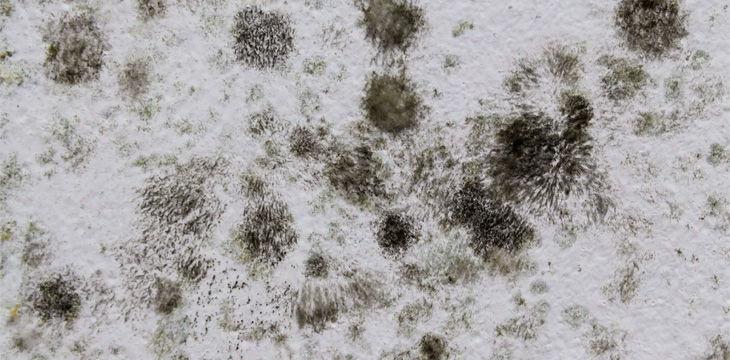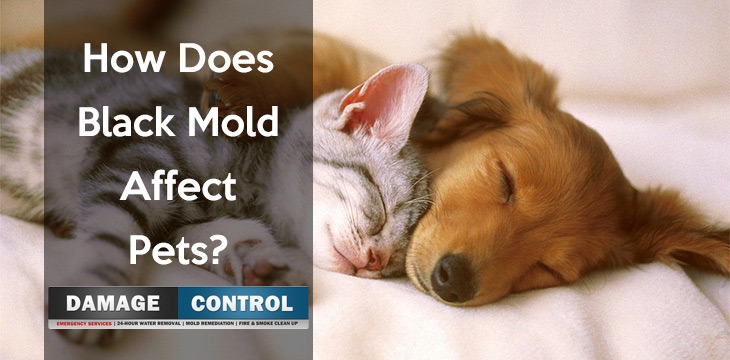If you’re wondering if mold affects dogs or cats, you’ve come to the right place. In a way, mold affects our pets even worse than it affects us. Where humans can suffer from a few respiratory problems and possible allergy problems, dogs and cats can experience a lot more.
Since their bodies are smaller, their bodies can’t take as much as ours can. Black mold can make dogs and cats sick. It can affect any other pet, too. In this article, we will tell you how mold affects pets.
Mold helps in the degradation and slow deterioration of organic material. Many fungi do this, but mold is especially apt at it, considering it produces mycotoxins.
Our pets are just as susceptible as we are. We have defenses against it, as do pets, but they will be worse off in the long run. They can even vomit and suffer from internal bleeding if the mold issues aren’t resolved. This article will also assist you with treating your pet’s mold exposure.
Mold can be a serious problem for you, your family, and your pets. It can be a trying time, but you can recover from it. Your pets can recover from mold exposure, too. Dogs and cats are more sensitive to mold exposure.
However, if you ever find that your pet has problems like breathing or a lot of vomit, you should take them to the vet immediately.
 What is Mold?
What is Mold?
Mold is a multicellular fungus growing in damp, warm colonies. This fungus helps degrade deteriorating organic matter, which can cause many problems for living things.
These fungi produce spores in the air and spread through these spores. They may grow into more colonies if they get into your body or on other surfaces.
It’s unlikely they will grow inside your body, but it will cause your immune system to go crazy. This includes your pets, too.
You can get sick from mold exposure even if you’re not sensitive to mold. Fatigue, chronic headaches, allergies, and more can come from mold exposure.
If you suspect you might have mold, getting a remediation service as quickly as possible is a good idea.
Molds also produce mycotoxins, which cause a negative reaction in our bodies. This is especially true for black mold.
It can worsen your sicknesses, including allergy problems, loss of appetite, mood swings, and more. Pets can also be affected. It can be dangerous for cats and dogs to experience mood swings.
How Does Mold Affect Pets?
Animals are just as organic as us, so their bodies are made up of living cells. As such, these mycotoxins and spores can affect them as we are.
However, their bodies react differently to these mycotoxins and mold spores. It’s even possible for them to be killed by it, although this is an extreme case and isn’t common.
Pet owners should immediately take their sick pets to a veterinarian because black mold harms dogs and cats. It may not be possible to pinpoint mold as the exact cause, but they can provide medicine to relax their immune system.
Your pet may suffer from black mold exposure if he or she exhibits any of the following symptoms:
- Constant sneezing
- A runny nose
- Vomit
- Joint pain with trouble walking
- Shaking
- Lethargy
- Sores
- Loss of fur
- Bleeding at the nose or mouth
- Excessive scratching and biting
These are all pretty serious symptoms, mold or not. If your pet experiences any of these, veterinarian assistance will be required. However, if any of these symptoms line up, you may want to get a mold kit and self-test your home for it.
There are other hints that mold could be in your home. One of the biggest hints that it might be mold is if you experience similar symptoms as your pet.
If your cat or dog have begun showing respiratory problems, you could feel similar symptoms. This includes trouble breathing, chronic headaches, and allergy problems.
Can Pet Urine Cause Mold?
All pets have accidents at some point or another. If you keep a dog or cat, they may accidentally go on the floor.
This is already annoying, but letting it linger can cause more damage than you think. Urine is already pretty gross, but it can slowly deteriorate into something worse and promote mold growth.
This is especially true since it’s warm.
It’s a good idea to clean up as much as possible to avoid lingering odors. However, since this is moisture, it will also cause water damage to the floor or wall.
Water damage is the prime reason mold growth occurs, and urine will promote mold growth. Clean your pet’s accidents as quickly as possible to avoid further damage.
Treating Your Pet for Mold Exposure
Getting rid of mold is the first step, and it's critically needed. If your pets are given veterinarian help, and you still have mold in your home, the treatment could be for nothing.
Mold remediation should be done as quickly as possible. There are many local mold removal and water damage contractors near you, so be sure to schedule an appointment.
Your veterinarian can tell you what to do with healing your pet, but it consists of a few things you can do at home. Usually, it revolves around:
- Caring for the pet
- Making sure it’s comfortable
- Managing any further vomiting, waste, etc.
- Any medication the vet may have given
If the mold is gone, your pet will heal on its own. Even if it’s black mold exposure, their bodies and ours can repair themselves and heal from the mycotoxins.
You may need to switch dog or cat food to be healthier, but make sure they get exercise after they have had time to heal as well.
Conclusion
Mold of any kind can be dangerous to our health. Black mold produces mycotoxins that we can get sick from, and our pets can also get sick. Their bodies are not quite as adept at handling it as ours can, so they may get a bit sicker than we do.
Mold and black mold can cause internal bleeding and sores on a dog or cat’s body. However, this also goes for many other pets as well. Ferrets, birds, and more can suffer from mold exposure.
Treating a pet is taking it to the veterinarian and supplying it with supportive care afterward. A dog or cat's body needs time to heal from mold exposure, but you may have to provide medicines or anything else the veterinarian offers.
A vet visit should be made immediately if your pet shows symptoms like constant sneezing, wheezing, quivering, stool changes, or bleeding.
You should look into your local mitigation contractors if you have mold in your home. Many people have gone through mold remediation.
Don’t worry or stress too much about mold, but you can’t sit idly if you have it. Water damage is the first key to possible mold damage, so never sit by if you have water damage.

